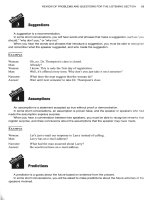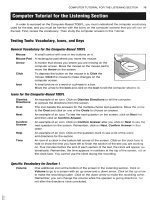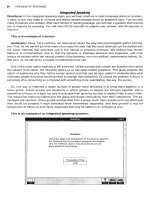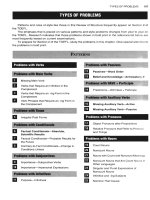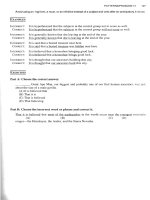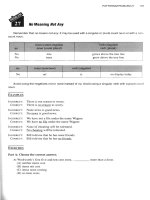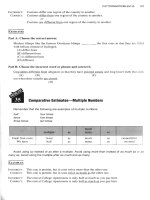Tài liệu How to prepare for the toefl part 12 pptx
Bạn đang xem bản rút gọn của tài liệu. Xem và tải ngay bản đầy đủ của tài liệu tại đây (524.1 KB, 10 trang )
TYPES
OF
PROBLEMS
107
Patterns and rules of style like those in this Review of structure frequently appear on Section
2
of
the TOEFL.
The emphasis that is placed on various patterns and style problems changes from year to year on
the TOEFL. Research indicates that those problems shown in bold print in the reference list below are
most frequently tested on current examinations.
To prepare for Section
2
of
the TOEFL, study the problems in this chapter. Give special attention to
the problems in bold print.
Passives-Word Order
0
Belief and Knowledge-Anticipatory
It
Missing Main Verb
I
-
7
Problems with
HAVE
+
Participle
Verbs that Require an Infinitive in the
Complement Predictions-
Will
Have
+
Participle
Verbs that Require an
-ing
Form in the
-
7
Complement
Verb Phrases that Require an
ing
Form in
.
the Complement Missing Auxiliary VerbActive
Missing Auxiliary VerbPassive
Irregular Past Forms
'
Problemwith Conditlonals
Factual Conditionals-Absolute,
Scientific Results
Factual Conditionals-Probable Results for
the Future
Contrary-to-Fact Conditionals-Change in
Conditions
Unless
Importance-Subjunctive Verbs
Importance-Impersonal Expressions
C
Problems with lnii,nitives
'
-
I
purpose-infinitives
Object Pronouns after Prepositions
Relative Pronouns that Refer to Persons
and Things
Count Nouns
Noncount Nouns
Nouns with Count and Noncount Meanings
Noncount Nouns that Are Count Nouns in
Other Languages
Singular and Plural Expressions of
Noncount Nouns
Infinitive and
ing
Subjects
Nominal
That
Clause
108
REVIEW
OF
STRUCTURE
-Ir+-=iw-PP
,
.
Addition-Besides
~rol;lezwith Determiner:
Cause-Because of and Because
Noncount Nouns with Qualifying Phrases-
The
NO
Meaning Not Any
-
Almost All of the and Most of the
TG6&E
&itli
~okira'ti~-s~
I-
-e-~^r*r C-IZC
Problems with Other Adjectives
Nouns that Function as Adjectives
Hyphenated Adjectives
Cause-and-Result-SO
Exact Similarity-the Same as and the Same
General Similarity-Like and Alike
General Difference-to Differ from
Comparative Estimate-Multiple Numbers
Comparative Estimates-More Than and
Less Than
Comparative Estimates-As Many As
Degrees of Comparison-Superlative
Adjectives
Degrees of Comparison-Irregular Adjectives
Double Comparatives
Correlative Conjunctions-lnclusives
not only.
.
.
but also
*pro
blJ
Future Result- When
Indirect Questions
Negative Emphasis
Duration-Forand Since
Generalization-As
a
Whole and Wholly
Sentences and Clauses
Illogical Comparatives-General Similarity
and Difference
TYPES
OF
PROBLEMS
109
Point of View-Verbs Redundancy-Unnecessary Phrases
Point of View-Verbs and Adverbs
Redundancy-Repetition of Words with the
Same Meaning
Redundancy-Repetition of Noun by
Pronoun
Agreement-Modified Subject and Verb
Agreement-Subject with Appositive and
Verb
Agreement-Verb-Subject Order
Transitive and Intransitive Verbs-Raise
and
Rise
Agreement-Noun and Pronoun
Transitive and Intransitive Verbs-Lay
Agreement-Subject and Possessive and
Lie
Pronouns
Transitive and lntransitive Verbs-Set
and
Sit
Similar Verbs-Make and
Do
Prepositional Idioms
Verbal Modifiers ing and
-ed
Forms parts of
speech
Verbal Modifiers-Infinitives of Purpose to
Introduce Instructions
Parallel Structure-In a Series
Parallel Structure-After Correlative
Conjunctions
110
REVIEW
OF
STRUCTURE
Patterns
are the parts of a sentence. In some books,
patterns
are called
structures.
In
patterns,
the
words have the same order most of the time.
Some of the most important patterns are summarized in this review section. Remember, the gener-
alizations in the charts and explanations for each pattern refer to the structure in the examples. There
may be similar structures for which these geneqalizations are not appropriate.
A
verb
is a word or phrase that expresses existence, action, or experience.
There are two kinds of verbs in English. They are the
main verb
and the
auxiliary verb.
In some
grammar books, the
auxiliary verb
is called a
helping verb
because it is used with a
main verb.
Every verb in English can be described by the following formula:
VERB
=
tense
+
(modal)
+
(have
+
participle)
+
(be
+
-ing)
+
verb word
Each
of
the parts of this formula will be summarized in one or more of the problems in this review.
Don't spend time studying it now. Just refer to it as you progress through this review section.
MS
WIT:
In English, a sentence must have a main verb.
A
sentence may or may not have an auxiliary verb.
Remember that every English sentence must have a subject and
a
main verb.
Avoid using an
-ingfon,
an infinitive, an auxiliary verb, or another part of speech instead of a main verb.
INCORRECT:
The prettiest girl in our class with long brown hair
and
brown eyes.
CORRECT:
The prettiest girl in our class
has
long brown
hair
and
brown eyes.
In my opinion, too soon to make a decision.
In my opinion,
it
too 'soon to make a decision.
Do you know whether the movie that starts at seven?
Do you know whether the movie that starts at seven
k
good?
or
Do you know whether the movie
starts
at seven?
Sam
almost always a lot of fun.
Sam
k
almost always a lot of fun.
The book that
I
lent you having a good bibliography.
The book that I lent you
has
a good bibliography.
Part
A:
Choose the correct answer.
Arizona a very dry climate.
(A)
has
(B) being
(C) having
(D)
with
Part
B:
Choose the incorrect word or phrase and correct it.
Venomous snakes
with
modified teeth connected to poison glands
in
which the venom is secreted
and
(A)
(B) (C)
(Dl
stored.
a
Verbs that Require an Infinitive in the Complement
Remember that the following verbs require an infinitive for
a
verb in the complement.
agree decide hesitate need refuse
appear
demand hope
offer seem
arrange
deserve intend plan tend
ask expect learn prepare threaten
claim
fail
manage pretend wait
consent forget mean promise want
tive)
Avoid using an
-ing
form after the verbs listed. Avoid using
a
verb word after
want.
S
We
V
had planned
M
to leave day before yesterday
112
REVIEW
OF
STRUCTURE
INCORRECT: He wanted speak with Mr. Brown.
CORRECT: He wanted to speak with
Mr.
Brown.
INCORRECT: We demand knowing our status.
CORRECT: We demand to know our status.
INCORRECT:
I intend the inform you that we cannot approve your application.
CORRECT:
I
intend to inform you that we cannot approve your application.
INCOPRECT:
They didn't plan buying a car.
CORRECT: They didn't plan to buy a car.
INCORRECT: The weather tends improving in May.
CORRECT: The weather
_tends
to improve in May.
Part
A:
Choose the correct answer.
One of the least effective ways of storing information is learning it.
(A)
how repeat
(B)
repeating
(C) to repeat
(D)
repeat
Part
B:
Choose the incorrect word or phrase and correct
it.
Representative democracy seemed evolve simultaneously
during
the eighteenth and nineteenth cen-
(A)
(B)
(C>
turies in Britain, Europe, and the United States.
(D)
a
Verbs that Require an
-ing
Form in the Complement
Remember that the following verbs require an
-ing
form for a verb in the complement:
admit
enjoy recall
appreciate finish recommend
a void keep regret
complete mention risk
consider
.
miss stop
delay postpone suggest
deny
practice tolerate
discuss quit understand
Avoid using an infinitive after the verbs listed.
Forbid
may be used with either an infinitive or an
-ing
complement, but
forbid from
is
not idiomatic.
INCORRECT: She is considering not to go.
CORRECT: She is considering not
going.
M
by plane
-
s
v
G-inpj
INCORRECT:
We enjoyed talk with your friend.
CORRECT: We enioyed
talking
with your friend.
He
INCORRECT:
Hank completed the writing his thesis this summer.
CORRECT: Hank completed writing his thesis this summer.
INCORRECT: I miss to watch the news when I am traveling.
CORRECT: I miss
watching
the news when I am traveling.
enjoys
INCORRECT: She mentions stop at El Paso in her letter.
CORRECT: She mentions
stoPr>ine,
at El Paso in her letter.
traveling
Part
A:
Choose the correct answer.
Strauss finished two of his published compositions before his tenth birthday.
(A) written
(B) write
(C) to write
(D)
writing
Part
B:
Choose the incorrect word or phrase and correct it.
Many people have stopped to smoke because they are afraid that it may be harmful to their health.
(A) (B)
(C)
(Dl
Verb Phrases that Require an
-ing
Form in the Complement
Remember that the following verb phrases require an
-ing
form for a verb in the complement:
approve of do not mind
keep on
be better off forget about look forward to
can't help get through object to
count on insist on
think about
think of
114
REVIEW
OF
STRUCTURE
Avoid using an infinitive after the verb phrases listed. Avoid using a verb word after
look
forward
to
and
object
to.
Remember that the verb phrase
BE
likely
does not require an
-ing
form but requires an infinitive in
the complement.
-
-
r
C
L.
.
-,
.
LNCORRECT:
She is likely knowing.
CORRECT: She is likely to know.
INCORRECT: Let's go to the movie when you get through to study.
CORRECT: Let's go to the movie when you get throu~h studying.
-
her appointment
V
C
(-ing)
INCORRECT: We can't help to wonder why she left.
CORRECT: We can't help wondering why she left.
INCORRECT: I have been looking forward to meet you.
CORRECT: I have been looking forward to meeting you.
canceling
-
INCORRECT: We wouldn't mind to wait.
CORRECT: We wouldn't mind waiting.
She
Part
A:
Choose the correct answer.
forgot about
Many modern architects insist on
materials native to the region that will blend into the
surrounding landscape.
(A)
use
(B) to use
(C) the use
(D)
using
Part
B:
Chme the incorrect word or phrase
and
correct it.
During Jackson's administration, those did not approve of permit common people in the White
(A)
(B)
House were shocked by the president's insistence that they be invited into the mansion.
(C)
(Dl
Many grammar books list a large number of
tenses
in English, but the
two
basic tenses are present
and past.
Auxiliary verbs are used with main verbs
to
express future and other special times.
4
Irregular Past Forms
Remember that past forms of the
following
irregular verbs are not the same as the participles:
Verb Word
be
beat
become
begin
bite
blow
break
choose
come
do
draw
drink
drive
eat
fall
fly
forget
forgive
freeze
get
give
90
grow
hide
know
ride
run
see
shake
show
shrink
sing
speak
steal
swear
swim
take
tear
throw
wear
weave
withdraw
write
Past
Form
wadwere
beat
became
began
bit
blew
broke
chose
came
did
drew
drank
drove
ate
fell
flew
forgot
forgave
froze
got
gave
went
grew
hid
knew
rode
ran
saw
shook
showed
shrank
sang
spoke
stole
swore
s
wam
took
tore
threw
wore
wove
withdrew
wrote
Participle
been
beaten
become
begun
bitten
blown
broken
chosen
come
done
drawn
drunk
driven
eaten
fallen
flown
forgotten
forgiven
frozen
gotten or got
given
gone
grown
hidden
known
ridden
run
seen
shaken
shown
shrunk
sung
spoken
stolen
sworn
swum
taken
torn
thrown
worn
woven
withdrawn
written
116
REVIEW
OF
STRUCTURE
Avoid using a participle instead
of
a past for simple past statements.
P
S
-
The concert
INCORRECT: They done it very well after they had practiced.
CORRECT: They
did
it very well after they had practiced.
INCORRECT: Before she run the computer program, she had checked it out with her supervisor.
CORRECT: Before she
ran
the computer program, she had checked it out with her supervisor.
-
.
-
-
-
.
-
.
v
(past>
began
INCORRECT: We eat dinner in Albuquerque on our vacation last year.
CORRECT: We
&
dinner in Albuquerque on our vacation last year.
M
at eight o'clock
INCORRECT:
My
nephew begun working for me about ten years ago.
CORRECT: My nephew began working for me about ten years ago.
INCORRECT: I know that you been forty on your last birthday.
CORRECT: I know that you
were
forty on your last birthday.
Part
A:
Choose the correct answer.
Before the Angles and the Saxons to England, the Iberians had lived there.
(A) coming
(B)
come
(C) came
(D)
did come
Part
B:
Choose the incorrect word or phrase and correct it.
When Columbus
seen
the New World, he thought that he had reached the East Indies by way of a
(A) (B)
(C>
(Dl
Western route.
Conditionals
are
statements with
if
or
unless.
They are opinions about the conditions (circum-
stances) that influence results, and opinions about the results.
There are two kinds of conditionals. In most grammar books, they are called
real
or
factual
condi-
tionals and
unreal
or
contrary-to-fact
conditionals.
Factual conditionals
express absolute, scientific
facts, probable results, or possible results.
Contrary-to-fact conditionals
express improbable or impossi-
ble results.
